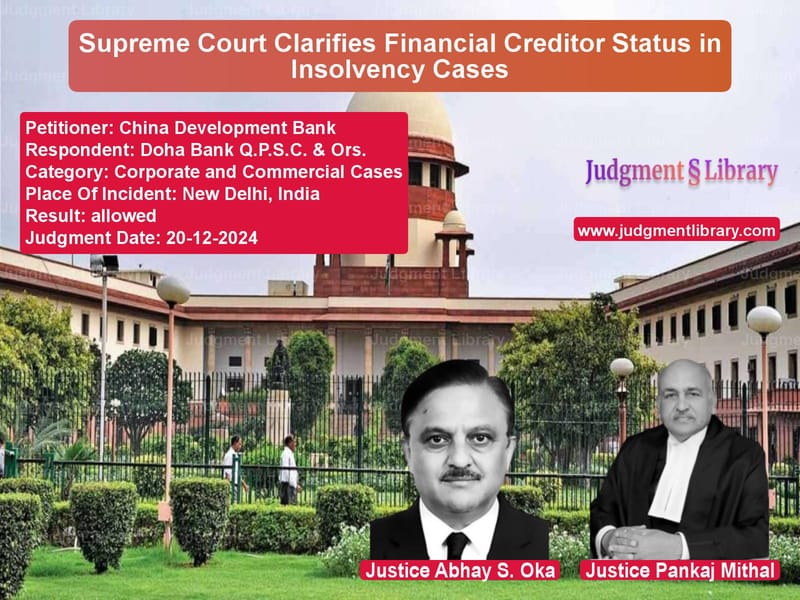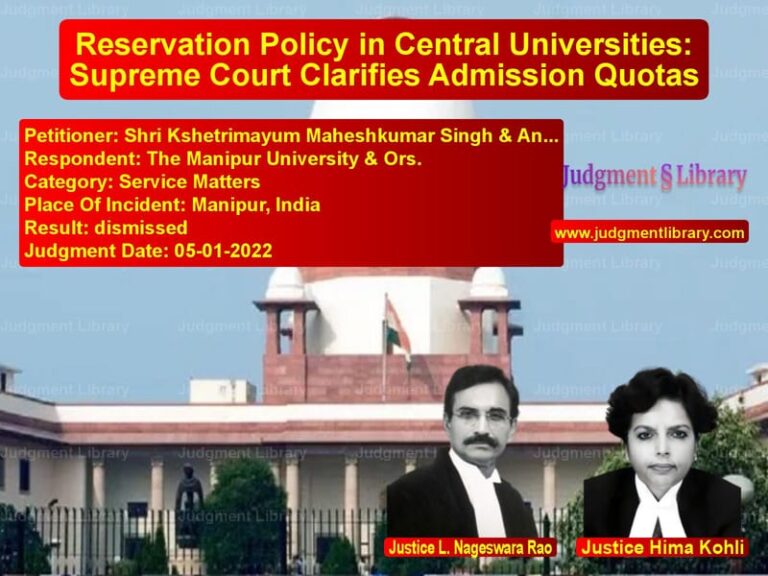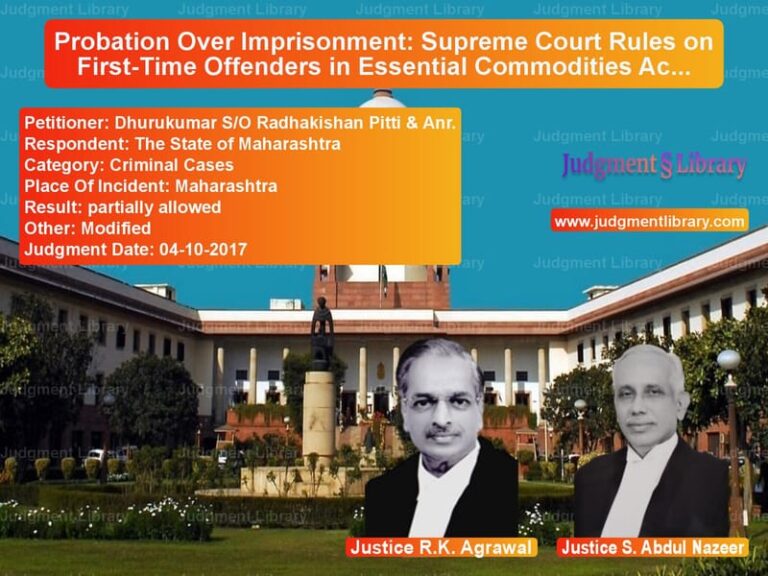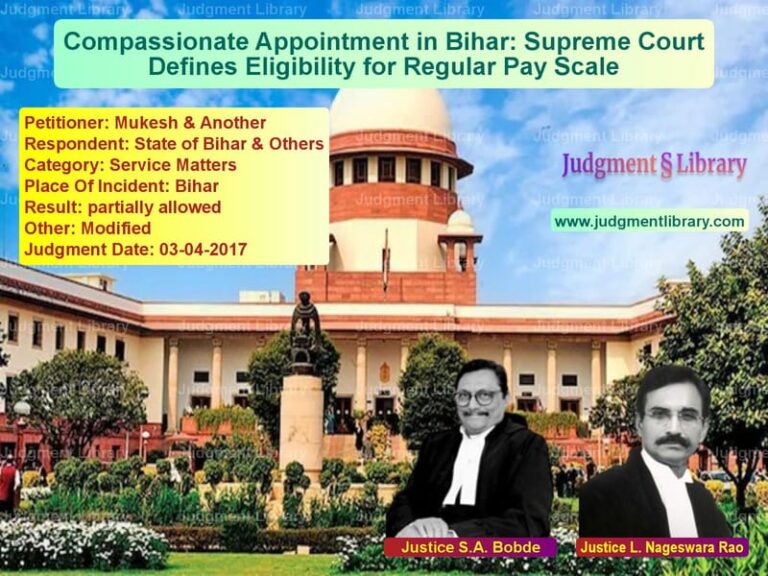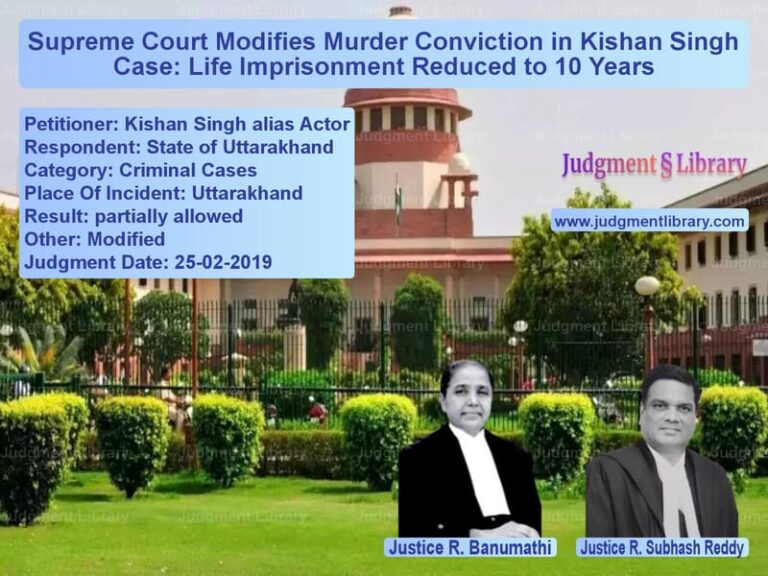Supreme Court Clarifies Financial Creditor Status in Insolvency Cases
The Supreme Court of India has provided a significant ruling in the case of China Development Bank v. Doha Bank Q.P.S.C. & Ors., where the Court clarified the classification of financial creditors under the Insolvency and Bankruptcy Code, 2016 (IBC). The Court ruled that the appellants, including China Development Bank and other international financial institutions, qualify as financial creditors, overturning the National Company Law Appellate Tribunal (NCLAT) decision that denied them this status.
Background of the Case
The dispute arose in the insolvency proceedings of Reliance Infratel Limited (RITL) and other related Reliance Communications entities. The key question before the Court was whether certain international banks and financial institutions, which had extended financial facilities and held security interests through deeds of hypothecation, could be classified as financial creditors under the IBC.
The primary contentions were:
- Whether the appellants could be classified as financial creditors as per Section 5(7) and Section 5(8) of the IBC.
- Whether they could be considered secured creditors entitled to distribution under the resolution plan.
- Whether hypothecation agreements providing security could be deemed as guarantees under the IBC.
Lower Court Findings
The NCLAT ruled against the appellants, stating that the Deeds of Hypothecation (DoH) executed by the corporate debtor did not constitute a guarantee. The appellate tribunal held that these deeds merely created a charge on assets without any explicit promise to discharge third-party liabilities, thereby disqualifying them from financial creditor status.
Supreme Court’s Analysis and Ruling
A bench comprising Justices Abhay S. Oka and Pankaj Mithal overturned the NCLAT ruling and reinstated the decision of the National Company Law Tribunal (NCLT), which had earlier recognized the appellants as financial creditors.
1. Classification as Financial Creditors
The Supreme Court analyzed the definition of financial debt under Section 5(8) of the IBC and found that the liabilities created under the Deeds of Hypothecation constituted a financial debt. The Court ruled:
“When a financial institution extends credit and the corporate debtor undertakes to pay any shortfall upon enforcement of security, it constitutes a guarantee under Section 126 of the Indian Contract Act, thereby qualifying as financial debt under the IBC.”
2. Deeds of Hypothecation as Guarantees
The respondents argued that the DoH were simple hypothecation agreements and did not contain an explicit guarantee clause. However, the Court emphasized the clause stating that in the event of default, the corporate debtor was obligated to cover any shortfall from asset realization. This, according to the Court, constituted a financial guarantee:
“The corporate debtor undertook an obligation to pay any shortfall in realization, which is a clear indicator of a contract of guarantee.”
3. Moratorium Under IBC
The respondents contended that due to the moratorium under Section 14 of the IBC, the enforcement of security interests was restricted, and thus, no financial debt could arise. The Supreme Court rejected this argument, stating:
“The moratorium does not extinguish a claim but merely restricts its enforcement. A financial debt exists irrespective of the enforceability of security under the moratorium.”
4. Commercial Wisdom and Committee of Creditors (CoC)
The Court also addressed the issue of CoC voting, where the appellants had participated in the resolution plan as financial creditors. The respondents argued that their participation in approving the resolution plan meant they had forfeited any additional claims. The Court ruled:
“The participation of financial creditors in the resolution plan does not preclude them from asserting their rightful classification under the IBC.”
Impact of the Judgment
The Supreme Court’s ruling has several far-reaching implications:
1. Strengthening the Rights of Financial Creditors
The judgment reaffirms that secured lenders with hypothecation agreements that include a payment obligation in case of shortfall qualify as financial creditors.
2. Clarification on Financial Guarantees
The decision clarifies that security documents that include a contingent liability on the corporate debtor can be treated as guarantees under the IBC.
3. Protecting the Interests of International Creditors
The ruling ensures that international lenders holding security interests in Indian corporate debt are recognized and protected under Indian insolvency law.
Conclusion
The Supreme Court’s judgment in China Development Bank v. Doha Bank Q.P.S.C. & Ors. sets a crucial precedent in India’s insolvency landscape. By recognizing the financial creditor status of secured lenders under hypothecation agreements, the Court has reinforced the principles of equitable treatment and commercial certainty in insolvency proceedings. This ruling will influence future cases involving financial creditors and secured transactions under the IBC.
Petitioner Name: China Development Bank.Respondent Name: Doha Bank Q.P.S.C. & Ors..Judgment By: Justice Abhay S. Oka, Justice Pankaj Mithal.Place Of Incident: New Delhi, India.Judgment Date: 20-12-2024.
Don’t miss out on the full details! Download the complete judgment in PDF format below and gain valuable insights instantly!
Download Judgment: china-development-ba-vs-doha-bank-q.p.s.c.-&-supreme-court-of-india-judgment-dated-20-12-2024.pdf
Directly Download Judgment: Directly download this Judgment
See all petitions in Bankruptcy and Insolvency
See all petitions in Corporate Compliance
See all petitions in Company Law
See all petitions in Judgment by Abhay S. Oka
See all petitions in Judgment by Pankaj Mithal
See all petitions in allowed
See all petitions in supreme court of India judgments December 2024
See all petitions in 2024 judgments
See all posts in Corporate and Commercial Cases Category
See all allowed petitions in Corporate and Commercial Cases Category
See all Dismissed petitions in Corporate and Commercial Cases Category
See all partially allowed petitions in Corporate and Commercial Cases Category

